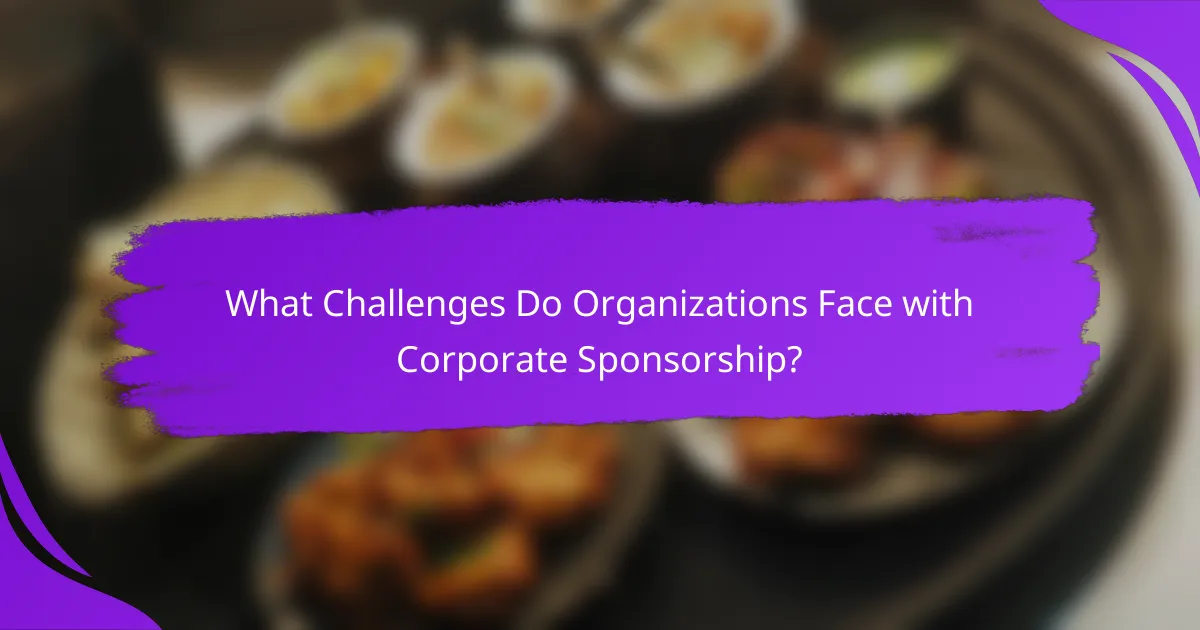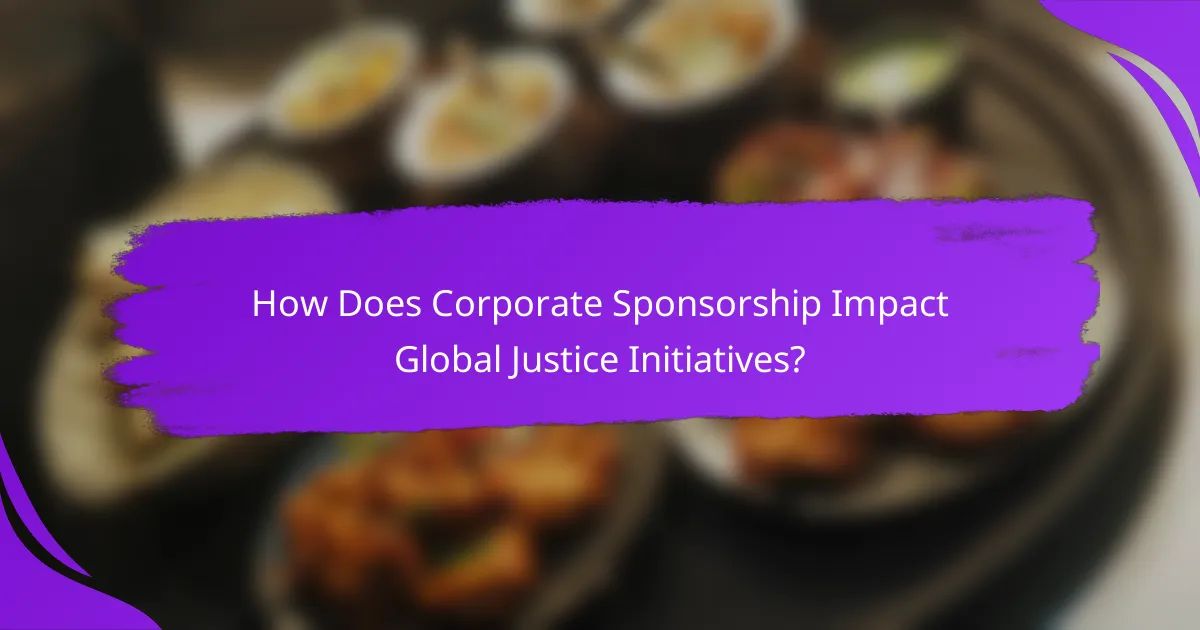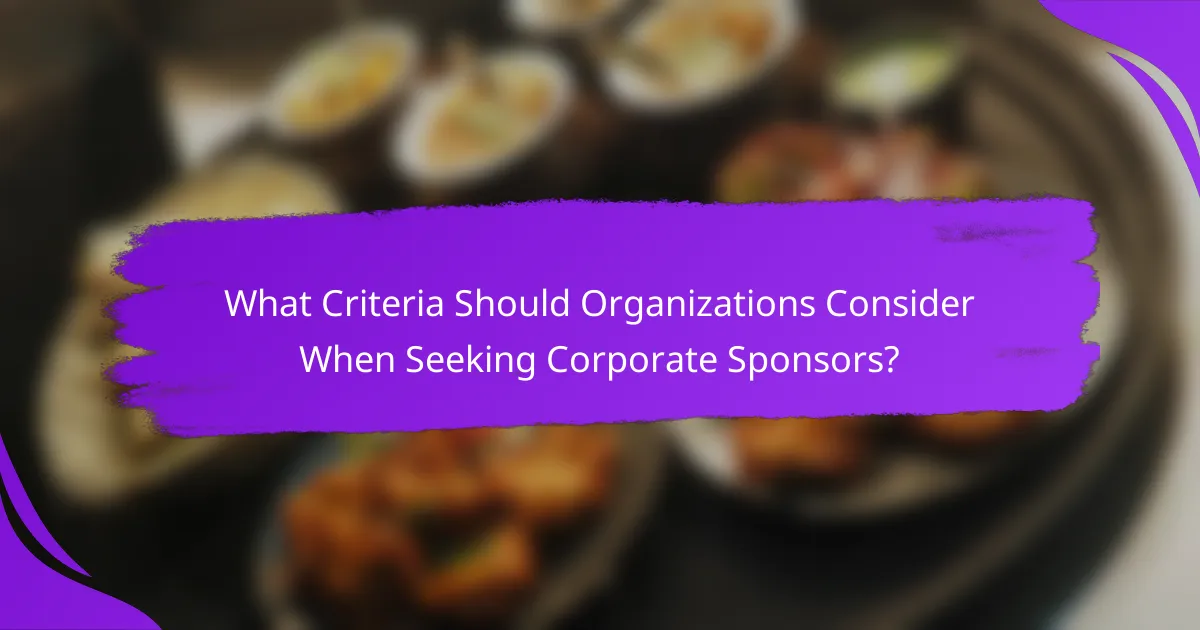Corporate sponsorship plays a pivotal role in global justice activism by providing essential funding and resources that can enhance visibility and amplify impact. However, this relationship is fraught with challenges, including potential conflicts of interest and concerns over brand alignment with activist goals, which can affect the integrity of the movement. Balancing these benefits and challenges is crucial for organizations striving to maintain their mission while leveraging corporate support.

What Are the Benefits of Corporate Sponsorship in Global Justice Activism?
Corporate sponsorship in global justice activism offers significant advantages, including increased funding, enhanced visibility, and access to valuable resources. These benefits can help organizations amplify their impact and reach their goals more effectively.
Increased Funding for Initiatives
Corporate sponsorship can provide essential financial support for global justice initiatives. This funding often comes in the form of direct donations, grants, or in-kind contributions, which can help organizations cover operational costs, project expenses, and outreach efforts.
Organizations should seek partnerships with corporations that align with their values to maximize funding potential. For instance, a nonprofit focused on environmental justice might partner with a company committed to sustainability, ensuring that the sponsorship aligns with their mission.
Enhanced Visibility for Causes
Corporate sponsorship can significantly boost the visibility of global justice causes. When a well-known brand supports an initiative, it can attract media attention and public interest, helping to raise awareness about critical issues.
To leverage this visibility, organizations should actively promote their partnerships through social media, press releases, and events. Highlighting the corporate sponsor’s involvement can create a win-win situation, increasing exposure for both the cause and the brand.
Access to Corporate Resources and Expertise
Corporate sponsors often provide access to valuable resources and expertise that can enhance the effectiveness of global justice initiatives. This may include technical support, marketing assistance, or logistical resources that organizations might not otherwise afford.
For example, a tech company might offer software solutions or data analysis expertise to a nonprofit working on social justice issues, enabling more efficient operations and better decision-making.
Strengthened Community Engagement
Corporate sponsorship can facilitate stronger community engagement by connecting organizations with local businesses and stakeholders. This collaboration can help build trust and foster relationships within the community, making initiatives more impactful.
Engaging the community through joint events or volunteer opportunities can further enhance this relationship. Organizations should encourage corporate partners to involve their employees in community service, creating a shared sense of purpose.
Improved Credibility and Trust
Having a reputable corporate sponsor can enhance an organization’s credibility and trustworthiness. When a well-respected company backs a cause, it signals to the public that the initiative is legitimate and worthy of support.
To maintain this credibility, organizations must ensure that their values align with those of their sponsors. Transparency about the partnership and its goals is crucial to avoid potential backlash and to foster long-term trust with supporters and the community.

What Challenges Do Organizations Face with Corporate Sponsorship?
Organizations engaging in corporate sponsorship often encounter significant challenges that can impact their mission and effectiveness. Key issues include potential conflicts of interest, brand misalignment with activist goals, public perception and backlash, and dependence on corporate funding.
Potential Conflicts of Interest
Corporate sponsorship can lead to conflicts of interest, where the values of the sponsoring company clash with the organization’s mission. For instance, an environmental group funded by a fossil fuel company may face scrutiny over its credibility and commitment to sustainability.
Organizations must carefully assess the alignment of their sponsors’ values with their own to avoid compromising their integrity. Establishing clear guidelines for sponsorship agreements can help mitigate these conflicts.
Brand Misalignment with Activist Goals
Brand misalignment occurs when a corporation’s image or practices contradict the activist goals of the organization. For example, a social justice group may struggle to reconcile its mission with a sponsor known for labor violations.
To address this, organizations should conduct thorough research on potential sponsors and ensure that their branding and messaging are consistent with their values. This alignment is crucial for maintaining authenticity and trust with supporters.
Public Perception and Backlash
Public perception can significantly shift when organizations accept corporate sponsorship, leading to backlash from supporters who view the partnership as a betrayal. Activists may feel that corporate funding undermines the organization’s credibility and independence.
To manage public perception, organizations should communicate transparently about their sponsorships and the rationale behind them. Engaging with stakeholders and addressing concerns proactively can help mitigate negative reactions.
Dependence on Corporate Funding
Relying heavily on corporate sponsorship can create financial vulnerability for organizations, especially if a major sponsor withdraws support. This dependence may limit an organization’s ability to advocate freely for its cause.
Organizations should diversify their funding sources to reduce reliance on any single sponsor. Exploring grants, individual donations, and crowdfunding can create a more sustainable financial model while preserving independence in advocacy efforts.

How Does Corporate Sponsorship Impact Global Justice Initiatives?
Corporate sponsorship can significantly influence global justice initiatives by providing essential funding and resources. However, it also raises concerns about potential conflicts of interest and the integrity of activist agendas.
Influence on Policy and Advocacy
Corporate sponsorship often affects policy and advocacy efforts by aligning them with the interests of sponsors. This can lead to a shift in priorities, where initiatives may focus on issues that resonate more with corporate stakeholders rather than grassroots needs.
For instance, a corporation focused on environmental sustainability might support projects that align with its business model, potentially sidelining broader social justice issues. Activists must navigate these dynamics carefully to maintain their core mission while leveraging corporate resources.
Shifts in Activism Strategies
The involvement of corporate sponsors can lead to shifts in activism strategies, as organizations may adopt more professionalized approaches to meet sponsor expectations. This can include enhanced marketing tactics, data-driven campaigns, and a focus on measurable outcomes.
While these strategies can increase visibility and funding, they may also dilute the grassroots nature of activism. Organizations should balance corporate expectations with their foundational values to avoid compromising their mission.
Long-term Sustainability of Projects
Corporate sponsorship can enhance the long-term sustainability of global justice projects by providing ongoing financial support. However, reliance on corporate funding can create vulnerabilities if sponsors withdraw their support or shift their priorities.
To mitigate this risk, organizations should diversify their funding sources, combining corporate sponsorship with grants, donations, and community support. This approach helps ensure that projects remain resilient and aligned with their original goals, regardless of changes in corporate interests.

What Criteria Should Organizations Consider When Seeking Corporate Sponsors?
Organizations should evaluate several key criteria when seeking corporate sponsors, including alignment of values, the reputation of potential sponsors, and their financial stability. These factors can significantly influence the success and integrity of the partnership.
Alignment of Values and Mission
Ensuring alignment between an organization’s values and those of potential sponsors is crucial. A mismatch can lead to public backlash and undermine the organization’s credibility. For instance, a human rights organization should avoid partnering with companies known for exploitative labor practices.
To assess alignment, organizations can create a checklist of core values and mission statements, comparing them with those of potential sponsors. This process helps identify synergies and potential conflicts before entering into a partnership.
Reputation and Brand Image of Sponsors
The reputation and brand image of sponsors play a vital role in shaping public perception of the partnership. Organizations should research potential sponsors’ past actions, controversies, and overall market standing. A well-regarded brand can enhance the organization’s image, while a tarnished one can cause reputational harm.
Conducting a thorough background check, including media coverage and stakeholder opinions, can provide insights into a sponsor’s public perception. Organizations should also consider how their audience views potential sponsors to avoid alienating supporters.
Financial Stability and Commitment
Financial stability is a critical factor when selecting corporate sponsors. Organizations should assess the sponsor’s financial health to ensure they can fulfill their commitments over the partnership’s duration. This includes reviewing financial statements and understanding the sponsor’s market position.
Additionally, organizations should seek sponsors with a demonstrated commitment to social responsibility. This can be gauged through their history of supporting similar initiatives or their willingness to engage in long-term partnerships rather than one-off donations. A reliable sponsor can provide sustained support, enhancing the organization’s impact in global justice activism.

How Can Organizations Measure the Success of Corporate Sponsorship?
Organizations can measure the success of corporate sponsorship by assessing both financial contributions and the resulting impact on their initiatives. Key metrics include funding effectiveness, brand visibility, and engagement levels among target audiences.
Tracking Funding Impact on Initiatives
To track the funding impact, organizations should establish clear objectives for each sponsorship. This includes defining what success looks like, such as the number of projects funded or specific outcomes achieved, like increased community outreach or enhanced program effectiveness.
Regularly review financial reports and compare them against project milestones to evaluate how sponsorship funds are utilized. For example, if a corporate sponsor contributes USD 50,000, organizations can assess whether this funding led to a measurable increase in program participation or service delivery.
Evaluating Brand Awareness and Engagement
Evaluating brand awareness involves measuring how well the corporate sponsor’s brand is recognized among the target audience. Surveys and social media analytics can provide insights into changes in brand perception before and after sponsorship initiatives.
Engagement metrics, such as event attendance or online interactions, can also indicate the effectiveness of the sponsorship. For instance, if a sponsored event sees a 30% increase in attendance compared to previous years, this suggests a successful partnership that enhances brand visibility.


